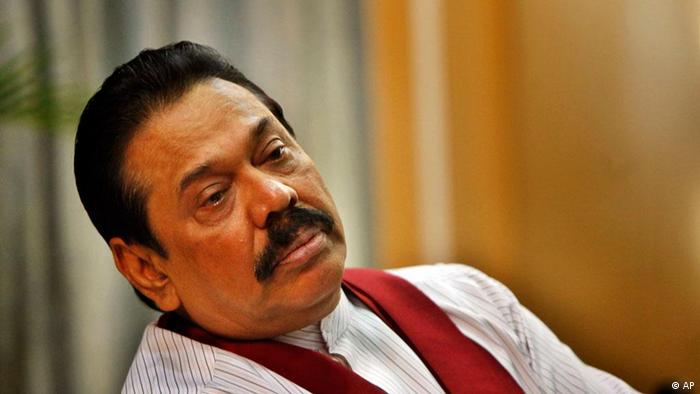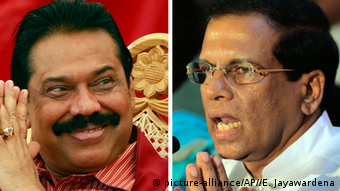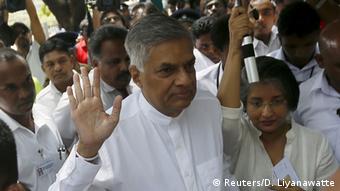After being toppled as president, Mahinda Rajapaksa wanted to become PM. But the Sri Lankan leader’s comeback bid has ended in defeat as early parliamentary poll results showed the ruling alliance made decisive gains.
“My dream of becoming prime minister has faded away,” Rajapaksa was quoted by news agency AFP on Tuesday, August 18, as saying. “I am conceding. We have lost a good fight.” The 69-year-old veteran leader, who was hoping to stage a political comeback after losing a presidential poll in January, accepted that his United People’s Freedom Alliance (UPFA) had lost even before Elections Commissioner Mahinda Deshapriya announced the final results.
The long-time president, considered a war hero by the country’s majority Sinhalese for presiding over the 2009 defeat of Tamil guerillas that ended a three-decade civil war, ran in the South Asian nation’s third-largest electoral district, Kurunagala, where many voters have relatives in the military. However, this wasn’t enough to lead his party to a nationwide victory.
Ruling UNP wins
Official results showed that while the ruling United National Party (UNP) fell just short of an outright parliamentary majority, Prime Minister Ranil Wickremesinghe will still command enough support to form a stable government. The UNP won 45.66 percent of the vote, or about 106 seats – just shy of a 113-seat majority. The main opposition garnered 42.38 percent, or 95 seats. Wickremesinghe will also have more authority than his predecessors after some of the powers of the PM post were enhanced back in April.
But why did Rajapaksa’s UPFA fail? Jayadeva Uyangoda, a Sri Lanka-based political scientist and constitutional expert, explained that the UPFA campaign relied exclusively on the support of majority Sinhalese-Buddhist voters, and offered no new ideas “except for the necessity to bring Rajapaksa back – the ‘strong’ and ‘macho’ ruler,” he told DW.
‘Rule of law, not rule of man’
In this context, Jehan Perera, Executive Director of Colombo-based National Peace Council (NPC), added that the election results closely resembled those of the presidential vote. “They reflected the anxieties of the ethnic and religious minorities about the conduct of the previous Rajapaksa government. While his coalition won in the predominantly Sinhalese rural and suburban areas, it lost heavily wherever there was an ethnically mixed population,” Perera told DW.
The political analyst also stressed that the results simply reflected the desire of a majority of Sri Lankans to be “in a country governed by the rule of law, and not ‘the rule of one man,’ which it became under Rajapaksa.”
Despite overseeing a decade of growing economic prosperity, Rajapaksa remains unpopular with the Tamil-minority in the north of the island-nation, and has been accused of failing to promote reconciliation between the Sinhalese and Tamil populations. Moreover, the former president has been criticized for having abused his presidential powers and filled positions of power with his relatives. This has prompted the new government to launch several probes into charges that Rajapaksa and his family siphoned off billions of dollars.
Need to compromise
But while the poll results may be a bitter blow for the UPFA, they represent a victory for the incumbent president. Maithripala Sirisena, a former minister in Rajapaksa’s administration, defected last year to run for president, and succeeded in defeating him in a bitterly fought election on promises of full-scale political reforms, which included reducing powers of the presidency and changes to the electoral system.
But Sirisena’s eight-month-old coalition government had struggled to pass key political reforms in parliament, ultimately prompting the president to call for the election for the 225-member parliament some 10 months ahead of schedule.
But has the gamble paid off? Analysts argue the results are favorable for the government to continue its reform agenda. “Now, the president and the PM can work together with a sense of certainty of support and outcomes,” said Uyangoda.
However, in order to get their constitutional reforms approved by parliament, it seems the president and PM will still need a two-third majority, meaning they will have to compromise with opposition parties, including the UPFA, to win over their support.
In fact, even before the official results were announced, PM Wickremesinghe struck a first conciliatory note: “It is not necessary to divide the people as winners and losers. I urge all to unite and help build our nation. Let us build a decent society. Let us work with consensus,” he told reporters.
More India, less China
In terms of foreign policy, it is very likely that Sirisena and Wickremesinghe will continue their policy of bolstering ties with neighboring India and scaling back ties with China. Citing a lack of transparency and government approvals, the Sri Lankan leaders halted construction work on a $1.4 billion port project off Colombo commissioned by Rajapaksa, who had turned mainly to China as a key source of financial support and development.
The move has prompted China to defend its investments and raised concerns in Beijing, which had increased its presence in the South Asian nation in recent years by pumping billions of dollars in investments and building critical infrastructure such as ports and airports.
A new comeback?
So what does this mean for Rajapaksa? Analysts believe that although Rajapaksa has suffered a heavy blow, he is unlikely to take it lying down. “It is likely that he will return to parliament and mobilize the opposition,” said Perera.
Yet the government faces difficult challenges. Among other things, it needs to revive the economy that became debt-ridden especially to China, and cope with the international scrutiny over alleged human rights violations at the final stages of the war.
“If the government starts to falter on any of these challenges, Rajapaksa can seek to make a comeback,” said Perera, pointing out that the former president could still become a force to be reckoned with in parliament. “By being an opposition parliamentarian, he can also seek to politicize the numerous investigations that are bound to be conducted into his government’s conduct during its years in office,” he added.
However, political expert Uyangoda indicates the opposition might first find it difficult to come to terms with the defeat given the rather hostile relationship between them and President Sirisena. “They are nervous about the continuation of corruption investigations as well as an upcoming UNHCR report on alleged war crimes. It is also likely that some opposition MPs join the current government.”


